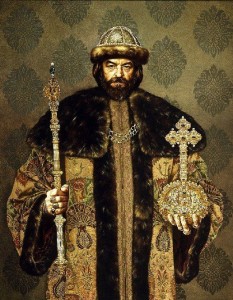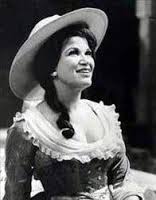
From its origins in medieval and Renaissance courtly entertainment, opera has always been partly rooted in spectacle. Nineteenth century French grand opera used large casts, expanded orchestras, grandiose scenery, consumes and special effects, and ballet to bring to life epic heroic tales based on historical subjects. (Meyerbeer’s five-act Les Huguenots from 1836 is an example.) A sense of theatricality and spectacle is at the heart of the Triumphant March from Verdi’s Aida, set in ancient Egypt.
History (this time recent) became mythologized in a similar way in John Adams’ 1987 opera, Nixon in China. Early in the first act, the landing of Nixon’s Air Force 1, dubbed the Spirit of ’76, and the appearance of the president and his entourage, take on Wagnerian weight. In Adams’ music, we can hear the plane emerge as a dot on the horizon and approach with an awe-inspiring crescendo, culminating in a heroic landing. The aircraft’s throbbing engines become as poetically powerful and significant as Lohengrin‘s swan. Spectacle takes center stage, literally, as the nose of the Spirit of ’76 suddenly engulfs the entire set.
But when it comes to the ultimate musical and dramatic fireworks, I can’t think of any moment in opera that tops the Coronation Scene from Modest Mussorgsky’s Boris Godunov, composed between 1868 and 1873. (If you can find an opera scene that pulls out more stops, please share it in the thread below.) As with the arrival of the Spirit of ’76 in Nixon in China, the Coronation Scene occurs early in Boris Godunov (the second scene of the Prologue). Both dramatic events are heightened by a powerful sense of anticipation. A crowd waits for Tsar Boris to appear from Moscow’s Cathedral of the Dormition and then sings his praises.
Suddenly, amid this celebratory spectacle, we’re drawn into the intimacy of Boris’ monologue. We enter the mind of the character and catch a glimpse of the darkness and tragedy ahead. A similar moment of contemplation occurs in Nixon in China as Nixon daydreams about public perception and his place in history.
[unordered_list style=”tick”]
- Find a recording of Boris Godunov at iTunes, Amazon.
- Here is the complete synopsis of the opera.
- Valery Gergiev’s performance of the Coronation Scene.
- a 1947 historic performance from Moscow’s Bolshoy Theater
[/unordered_list]

